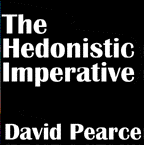







4. Objections.
No 28
Prescription and prediction are easily muddled. It is advocated that all involuntary suffering should be abolished. It is predicted that all suffering will be abolished. On this perspective, our descendants are no more likely to submit themselves to emotional pain and malaise than we would today opt to undergo a major surgical operation without an anaesthetic.
In practice, an ethic of absolute personal freedom is probably untenable. Even the devout libertarian will sanction, say, the administration of a foul-tasting medicine to an unwilling sick youngster, or the forcible injection of an anaesthetic into a struggling animal before veterinary surgery. We sometimes override the choices and desires of simple minds. It would be cruel to do otherwise. Non-human animals, the severely mentally disabled and very young children don't know their own interests; mature adults are different. The problem here is that super-intelligent extraterrestrials - or our own advanced descendants - may perceive us, primitive Homo sapiens, as comparatively no less mentally defective than are toddlers or pets in our eyes today. Any advanced intelligence may discern the analogous way that Darwinian minds are locked in dysfunctional cycles of self-abuse - unaware of our own interests. If so, then should we/small children be allowed to keep on hurting ourselves so badly?
As libertarians, we must presumably answer yes. This stance would seem hard to reconcile with a utilitarian ethic. For what are a few minutes of unpleasantness compared to an eternity of bliss? Yet even to moot the involuntary treatment of malcontents, let alone advocate its practice, is a dangerous line of argument for the abolitionist to pursue. For the misconception that anyone is going to coerce us into being happy is one of the biggest ideological obstacles to the abolition of suffering. Fortunately, it is a mistake to believe that even a utilitarian ethicist is committed to mandatory therapy for the emotionally sick. This is because even the hint of compulsion causes distress to most people - thereby sabotaging the abolitionist project and defeating the utilitarian's own ends.
So the spectre of dissident emotional primitives being dragged kicking and screaming into the pleasure chambers should not become the defining image of abolitionist ideology. Conjuring up such a travesty of paradise-engineering doesn't show that a utilitarian ethic is mistaken. Instead it illustrates that the advocacy of compulsion is not a truly utilitarian policy at all. Like so many arguments against a utilitarian ethic, it relies on misconceived policy prescriptions wrongly derived from the sovereign utility-maximising principle.
Abolitionists may call themselves fanatical libertarians on solid utilitarian grounds. For the freedom to transcend our Darwinian past and to choose our own level of well-being is one of the most persuasive arguments for the abolitionist case.
E-mail Dave : dave@hedweb.com